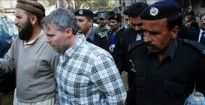Arrested American Worked for CIA
The American arrested in Pakistan after shooting two men at a crowded traffic stop was part of a covert, C.I.A.-led team of operatives conducting surveillance on militant groups deep inside the country, according to American government officials.
Working from a safe house in the eastern city of Lahore, the detained American contractor, Raymond A. Davis, a retired Special Forces soldier, carried out scouting and other reconnaissance missions for a Central Intelligence Agency task force of case officers and technical surveillance experts, the officials said.
Mr. Davis’s arrest and detention, which came after what American officials have described as a botched robbery attempt, has inadvertently pulled back the curtain on a web of covert American operations inside Pakistan, part of a secret war run by the C.I.A. It has exacerbated already frayed relations between the American intelligence agency and its Pakistani counterpart, created a political dilemma for the weak, pro-American Pakistani government, and further threatened the stability of the country, which has the world’s fastest growing nuclear arsenal.
Without describing Mr. Davis’s mission or intelligence affiliation, President Obama last week made a public plea for his release. Meanwhile, there have been a flurry of private phone calls to Pakistan from Leon E. Panetta, the C.I.A. director, and Adm. Mike Mullen, chairman of the Joint Chiefs of Staff, all intended to persuade the Pakistanis to release the secret operative. Mr. Davis has worked for years as a C.I.A. contractor, including time at Blackwater Worldwide, the controversial private security firm (now called Xe) that Pakistanis have long viewed as symbolizing a culture of American gun slinging overseas.
The New York Times had agreed to temporarily withhold information about Mr. Davis’s ties to the agency at the request of the Obama administration, which argued that disclosure of his specific job would put his life at risk. Several foreign news organizations have disclosed some aspects of Mr. Davis’s work with the C.I.A., and on Monday, American officials lifted their request to withhold publication.
Since the United States is not at war in Pakistan, the American military is largely restricted from operating in the country. So the Central Intelligence Agency has taken on an expanded role, operating armed drones that kill militants inside the country and running covert operations, sometimes without the knowledge of the Pakistanis.
Several American and Pakistani officials said that the C.I.A. team in Lahore with which Mr. Davis worked was tasked with tracking the movements of various Pakistani militant groups, including Lashkar-e-Taiba, a particularly violent group that Pakistan uses as a proxy force against India but that the United States considers a threat to allied troops in Afghanistan. For the Pakistanis, such spying inside their country is an extremely delicate issue, particularly since Lashkar has longstanding ties to Pakistan’s intelligence service, the Directorate for Inter-Services Intelligence, or ISI.
Still, American and Pakistani officials use Lahore as a base of operations to investigate the militant groups and their madrasas in the surrounding area.
The officials gave various accounts of the makeup of the covert task force and of Mr. Davis, who at the time of his arrest was carrying a Glock pistol, a long-range wireless set, a small telescope and a headlamp. An American and a Pakistani official said in interviews that operatives from the Pentagon’s Joint Special Operations Command had been assigned to the group to help with the surveillance missions. Other American officials, however, said that no military personnel were involved with the task force.
Special operations troops routinely work with the C.I.A. in Pakistan. Among other things, they helped the agency pinpoint the location of Mullah Abdul Ghani Baradar, the deputy Taliban commander who was arrested in January 2010 in Karachi.
Even before his arrest, Mr. Davis’s C.I.A. affiliation was known to Pakistani authorities, who keep close tabs on the movements of Americans. His visa, presented to the Ministry of Foreign Affairs in late 2009, describes his job as a “regional affairs officer,” a common job description for officials working with the agency.
Click here to read more.


